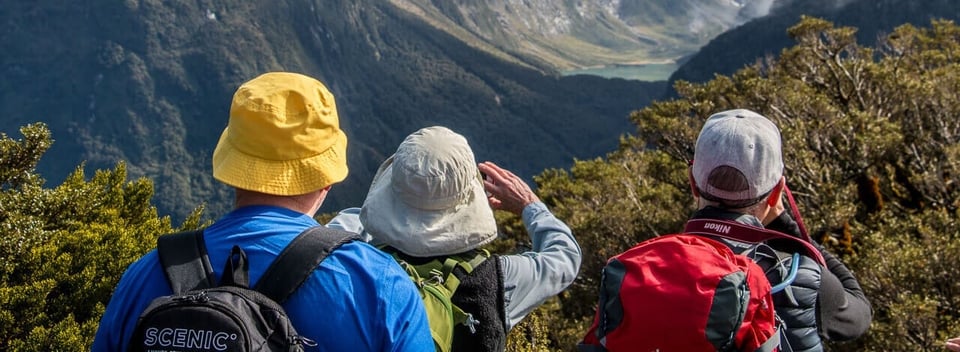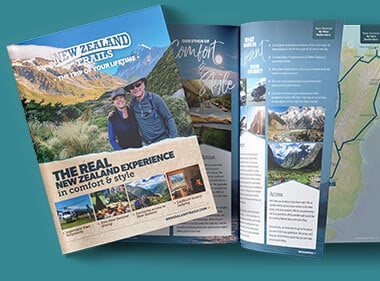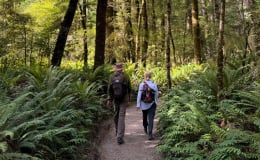
What to Pack for New Zealand

Packing for a New Zealand adventure doesn't need to be daunting. To make life a little easier for you, we have compiled an Ultimate Packing Guide. Depending on how long your stay will be and what you plan on doing, there should be some helpful guidelines below to get you started. Happy travels!
Choosing the right bag
The type of bag you decide to bring with you to New Zealand depends entirely on the style of travel you are doing.
Hard case roller suitcase – this is perfect if you are self-driving or on a bus tour and staying in hotels in main centres. Most hotels will have elevators to get to higher levels. Just be warned, New Zealand motels often only offer stair access to higher levels, so you will need to carry your bags up.
Soft case roller with longer handles – this one is a great hybrid. Easy to move around and can slip over the shoulder for ease of carrying up stairs or over uneven terrain. This is a great option for those travelling on a New Zealand Trails tour, as we tend to stay in off-the-beaten-track locations.
Backpack – a great option for those travelling to New Zealand and wishing to do some multi-day hikes, hitch-hiking (still very common in New Zealand) or walking around a lot with their bags.
Daypack – an essential for your trip to New Zealand. You are likely to head outdoors at some stage during your holiday and will need to be prepared for all weather conditions. If you are day hiking, your daypack should contain; wet weather gear, first aid kit, warm clothes (including a hat and gloves), water, sunscreen (and sunhat if you are not already wearing it), plus other optional items such as insect repellent, camera gear, phone, snacks, lunch etc. Make sure your daypack is big enough to carry these items.

So many backpack options... which to choose?
Pack liner – super important to keep your gear dry; line your daypack with a dry bag or quality plastic bag. Pack covers are great if it's only light rain, however, if there is a downpour they tend to fill with water in the bottom and soak into your pack. If going on a multi-day hike, make sure to use a larger bag to line your backpack – too often we have seen people soaked to the bone in alpine regions of New Zealand with no dry gear because they didn’t use a pack liner!
Footwear
Hiking boots – many of our trails in New Zealand will require hiking boots, and while you don’t need to spend a lot of money on the latest trends, good ankle support is essential. We don’t recommend heavy leather boots when you are travelling here. While they are incredibly hardy footwear, they are likely to get wet, and wet leather boots are heavy and hard to dry.

These cheeky Keas approve of this choice of hiking boots.
Gaiters – these are used more to keep stuff out of your boots rather than keeping them dry in New Zealand. Chances are if you are crossing a river or stream then the water level will be over your boot, meaning your feet are going to get wet no matter how waterproof everything is. Gaiters are great for stopping small stones, beech leaves and other debris getting into your boots – though while handy, aren’t absolutely necessary (highly recommended for backcountry hikes though, where debris can turn into nasty blisters – like on our Kiwi Classic tour).
Hiking sandals or sneakers – these are great for cruising around short walks, towns, or just everyday wear.
Flip-flops – we call these jandals in New Zealand (fun fact – jandal is shortened down from Japanese Sandal). Super light and easy to pack, you can’t go past a pair of jandals.
Nice shoes – New Zealand is a very casual country so you don’t need to go packing your best pair of heels or dress shoes. Pack a nice pair of flats for dressing up here. Sometimes hiking sandals can be quite fashionable too, you can’t beat double duty on a bulky item!
Go local!– go barefoot, it’s a Kiwi tradition and one you are likely to see all over our country during warm summer days (and not just on the beach).
Clothing
Quick dry clothes – these are great for travelling in New Zealand, as you never know when the rain will catch you out. Hiking pants that turn into shorts are a handy way to keep the luggage down.
Socks – bring plenty of pairs of socks, they will get wet at some stage so it's nice to have a spare pair handy. Make sure they aren’t cotton socks, they take forever to dry when travelling and if you are prone to cold feet then think about thermal socks like wool (yes, we love our wool here). Socks are also great at keeping those pesky sandflies off your feet - so rock that socks and sandals look!
Layers – whatever the season make sure to pack some layers. It may be hot and muggy one day and cold and snowy the next, regardless of the season. We recommend some t-shirts or tank tops for warmer days and thicker layers for when it gets cold. We swear by merino wool here for warmth, but a fleece layer or down jacket works great too.
Thermals – this is an important layer and is often overlooked, especially the pants. These pack down small and are light so there’s really no reason to not have them.
Togs – Kiwi for ‘swimwear’, and essential, especially in summer. With so many places you can jump in and cool off, having your togs on hand is a must.

Don't miss out on taking a dip in some awesome spots, pack those togs!
Nice clothes – as mentioned in the footwear section, we are a very casual nation. You could go out to a night spot here dressed to the nines and see someone wearing jeans and jandals beside you. Pack whatever you are comfortable in, and don’t stress about super fancy clothes. Tidy casual is a good way to think of it.
Minimal cotton – when cotton gets wet it takes a long time to dry and can draw precious heat away from the body, so is less than ideal in the outdoors. If you want to bring cotton with you, make sure it’s just for casual city clothes. Examples of cotton clothing are jeans/denim, t-shirts and sweatshirts. More and more companies are making outdoor gear stylish, so it can perform double duty in the wilderness and still look appropriate for dinner.
Quick-dry towel – super handy for places that don’t supply towels, or that impromptu dip in a lake. Quick dry towels are lightweight for carrying on multi-day hikes and definitely beat slow drying, heavy cotton towels. They are a traveller's must-have. On our New Zealand Trails tours we carry extra towels for those who just feel the need to jump into the water during our travels – so don’t forget to have your togs handy!
Toiletries
Prescription medication – make sure to bring a doctor's note if you need to carry more than a month's worth of medication, or if it is a controlled substance in New Zealand. Always think ahead to bring enough medication for your trip.
Earplugs – highly recommended for anyone who might be staying in hostels, camping or planning on doing multi-day hikes in New Zealand. All these activities have plenty of ambient sounds around, from snoring, shuffling and sleep-talking at night, so having a pair of earplugs handy will help you get a better night's sleep.
Sanitary items – these are available in New Zealand but it's a good idea to stock up at home and make sure to pack enough to cover your travels here.
Soap - you will find that a lot of places in New Zealand don't supply soap in the shower (usually only at the washroom sink). So if you want to lather up after a long day exploring New Zealand pack some extra soap or body wash.
Techie stuff
New Zealand/Universal adapter plug – this will need to be a converter as well, due to the voltage difference in New Zealand. Our plugs operate at 240v while the USA operates on 110v – you don’t want to blow your precious gadgets while on vacation. Make sure your adapter is rated up to 240v.
Mobile phone – you'll want to take heaps of photos and videos to remember your time here, and these days modern phones have excellent quality cameras. You can pick up a local sim card when you arrive for ease of communicating with home, you can get really good deals on short-term phone plans in New Zealand.
Spare camera gear – make sure to have plenty of spare memory cards and camera batteries handy. You will be snapping photos all over the show when travelling through our beautiful scenery.

Your phone or camera is a must to capture those memories of your trip
Entertainment – these days phones can offer up a plethora of entertainment, from podcasts to games and everything in between. Make sure to stock up on some entertainment to fill in those gaps, whether travelling or bad weather days. Another option is an e-reader for books; these are handy and lightweight, especially for avid readers. Or, if you need the feel of pages in your hands, there are plenty of book exchanges around the country; you just need one to start out with. Note, books can be expensive in New Zealand, so it’s a good idea to bring one from home.
Protection from the elements
According to the World Economic Forum, New Zealand is one of the safest countries in the world. And, while that's excellent news for visitors, there are still some safety precautions that you do need to take into consideration. Mainly these revolve around our unpredictable natural environment.
You should always carry warm gear, extra snacks, rain gear, water and a personal first aid kit with you whenever you head out on a trail in New Zealand, even if it’s only for a couple of hours.
First aid kit – there are plenty of guides online to help you to build your own personal first aid kit, or visit your outdoor store for advice on the many pre-built first aid kits available.
Insect repellent – in some parts of the country you may encounter sandflies, so protect yourself with long clothes and plenty of bug spray.
Sunscreen/sunhat – protect yourself with sunscreen and a good sunhat.
Rain gear – this should be hardy and waterproof. A flimsy rain poncho just won’t cut it in our weather conditions. Going for a breathable material is great if you are likely to be hiking in rain gear. Consult your outdoor specialist for more information on suitable waterproof clothing.
Water bottle – let's reduce waste! You can refill your water bottle almost anywhere in New Zealand, and here at New Zealand Trails, we do our bit for the environment by providing refilling stations on our vans.

There are lots of opportunities to fill up your water bottle in New Zealand
Sunglasses – these are important to protect your eyes from the sun, but you may not have thought about their other uses. They're great for boat rides, especially on jet boats where the wind is directly in your face. So if you are doing our World Heritage Walking Tour or Pure South trips – don’t forget to pack your sunnies!
Hat and gloves – a very important part of your daypack essentials, as weather can change very quickly here. Putting on a hat and gloves can help retain precious body heat if the temperature drops dramatically.
Buy in New Zealand
Special dietary foods – we have a great selection and variety in our supermarkets for dietary requirements. This means you shouldn’t need to carry loads of special food from home. We cater to a variety of food allergies including gluten and dairy free, as well as having FODMAP foods available in our supermarkets. Many religious requirements are catered for as well, with Kosher and Halaal foods available throughout New Zealand – we have been exporting Halaal meat to the Middle East since the 1970’s!
Merino wool – while expensive in New Zealand, you would be supporting New Zealand producers and getting a great product for yourself. Some famous New Zealand brands are Icebreaker and Mons Royale, who source our best merino wool for quality garments, to keep you both warm and stylish. If buying new is out of your budget, you can pick up a bargain in outlet stores located around the country or trawl the second-hand shops that are prevalent here – you might be surprised at how much merino is available.
Don't bother with these
Hiking gear – such as hiking packs, sleeping bags, sleeping mats, tents, hiking poles etc. Unless you are going to be on multi-day treks for most of your time here, the chances are you will do one or maybe two multi-day walks during your travels. Why lug all that extra gear around for a few days' use? In New Zealand we have places that hire gear, handily located in centres like Queenstown, where many people base themselves before heading out. Hiring gear is affordable and a great way to save weight when travelling. Also, if you are doing a hiking tour, chat with the company you are going with. Many, like New Zealand Trails, will provide hiking gear you may require as part of your tour.
Snow gear – this is the same deal as hiking gear. Unless your holiday is solely skiing/snowboarding, then check out the gear packages available at most ski resorts and in local towns during the ski season.
If you have any questions at all about what you need to pack for your trip with New Zealand Trails, get in touch and we'll be happy to help.
Check our trip schedules and availability on our availability page. To work out which trip suits you best, check out Which Trip is Right For Me.
Request your FREE NEW ZEALAND TRAILS brochure here now for articles, stories and information on our 5 guided trip options.








